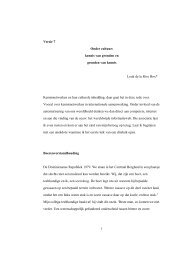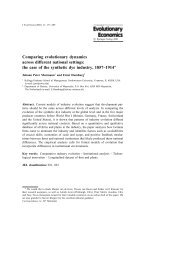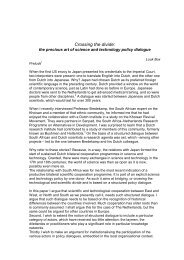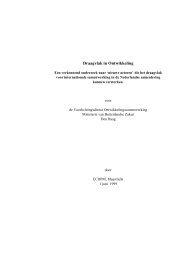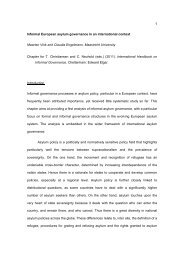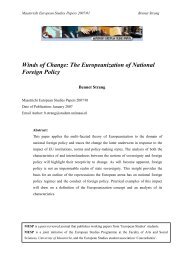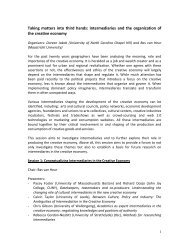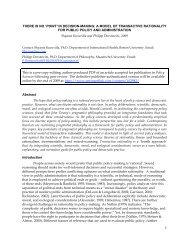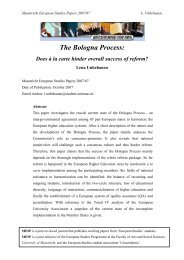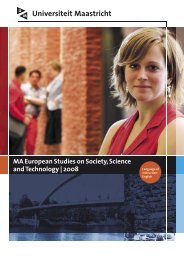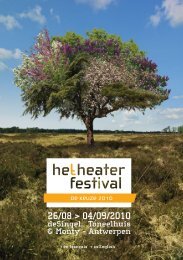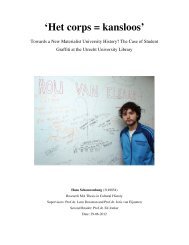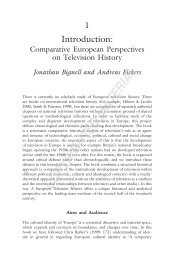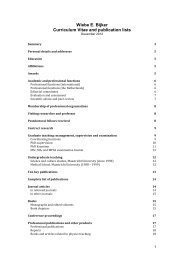About the Journal - Cities Institute
About the Journal - Cities Institute
About the Journal - Cities Institute
Create successful ePaper yourself
Turn your PDF publications into a flip-book with our unique Google optimized e-Paper software.
experience in a wide array of contexts, through <strong>the</strong> use of diverse case studies, <strong>the</strong><br />
text raises and addresses a variety of questions about <strong>the</strong> implications of <strong>the</strong> global<br />
shift from products and services towards experiences (Pine and Gilmore, 1999). It<br />
reveals that this shift has already begun to create an entirely new context for leisure<br />
and tourism activities and that tourism and leisure service providers will need to<br />
adapt quickly and proactively to, if <strong>the</strong>y are to gain and maintain a competitive<br />
advantage. Although <strong>the</strong> full range of managerial implications of this new reality is<br />
yet to be clearly identified, <strong>the</strong>re are strong indications that au<strong>the</strong>nticity, interactivity<br />
and storytelling are <strong>the</strong> pillars of <strong>the</strong> new, experience economy.<br />
The Tourism and Leisure Experience helps define <strong>the</strong> new context of service provision<br />
within <strong>the</strong> sector, addresses key issues and provides several case studies to highlight<br />
<strong>the</strong> practical implications associated with adopting an experiential approach to<br />
tourism and leisure. It is a worthwhile read for anyone studying, researching or<br />
providing tourism and leisure experiences.<br />
References<br />
Bryman, A. (1999). The Disneyization of dociety. The Sociological Review. 47(1), 25-47.<br />
Csikszentmihalyi, M. (1975). Beyond boredom and anxiety: Experiencing flow in work<br />
and play. San Francisco: Jossey-Bass.<br />
Csikszentmihalyi, M. (1990). Flow: The psychology of optimal experience. New York:<br />
Harper and Row.<br />
Csikzentmihalyi, M. (1998). Finding flow: The psychology of engagement with<br />
everyday life. New York: Basic Books<br />
Jensen, R. (1999). The dream society: How <strong>the</strong> coming shift from information to<br />
imagination will transform your business. London: McGraw-Hill<br />
Mathieson, A. and Wall, G. (1995). Tourism: Economic, physical and social impacts.<br />
Harlow: Longman Group Limited.<br />
McCabe, S. (2009). Marketing communications in tourism and hospitality: Concepts,<br />
strategies and cases. Oxford: Elsevier, Butterworth-Heinemann<br />
Pine, B.J. and Gilmore, J.H. (1999). The experience economy: Work is <strong>the</strong>atre and<br />
every business a stage. Boston: Harvard Business School Press.<br />
Ritzer, G. (1993). The McDonaldization of society: The changing character of<br />
contemporary social life. Newbury Park, Calif: Pine Forge Press.<br />
<strong>About</strong> <strong>the</strong> Author<br />
Ivna Reic is a Senior Lecturer in Events and Creative Industries Management at <strong>the</strong><br />
London Metropolitan Business School. Her research interests include sustainability<br />
and contemporary marketing practices within <strong>the</strong> events industry, corporate events<br />
and <strong>the</strong> evaluation of general management <strong>the</strong>ories in <strong>the</strong> context of events<br />
management.<br />
39



